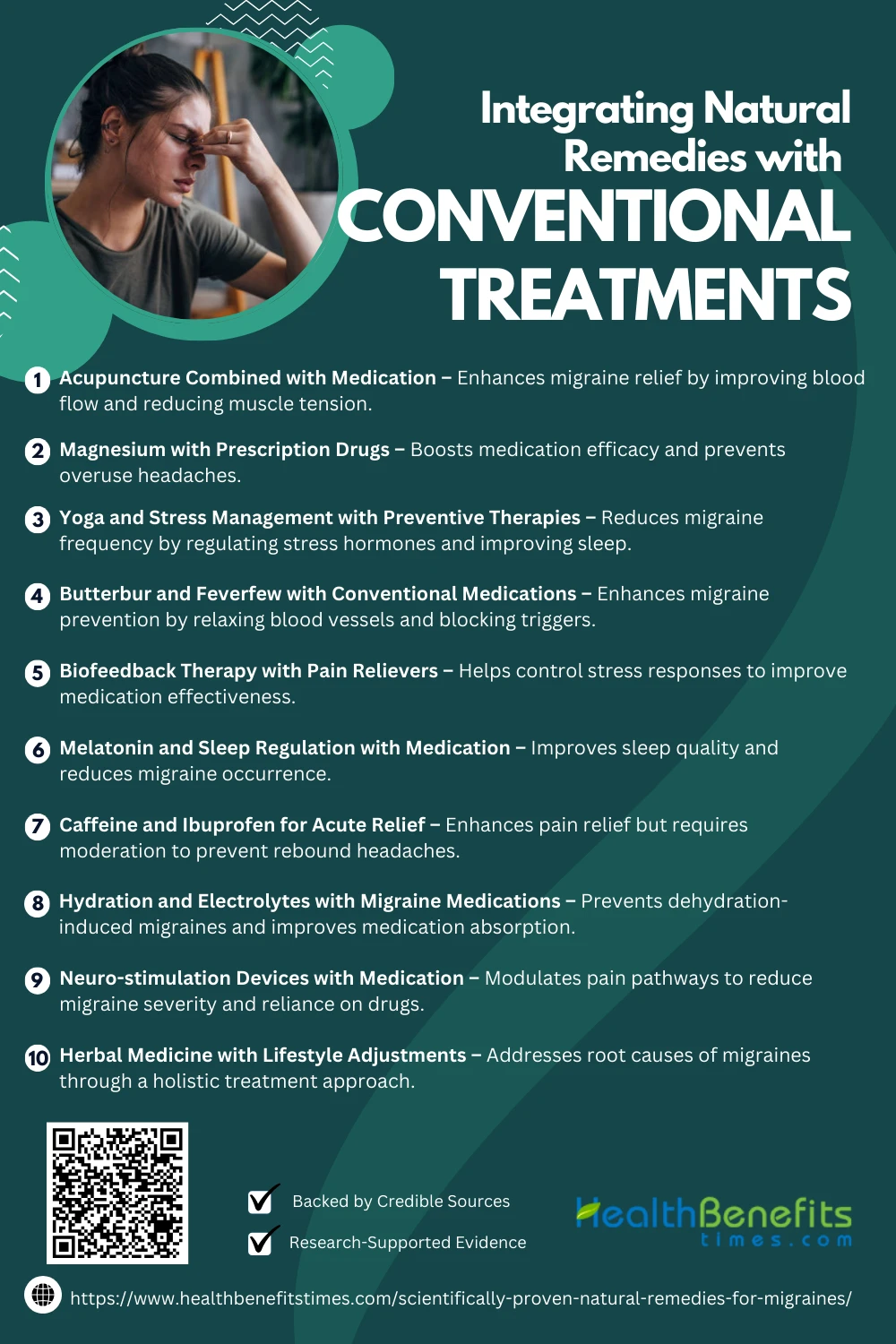- A migraine is a neurological condition characterized by intense, throbbing headaches, often accompanied by nausea, sensitivity to light, and sound.
- Science-backed natural remedies include magnesium, riboflavin (Vitamin B2), and herbal options like feverfew and butterbur, which have been shown to reduce migraine frequency and severity.
- Lifestyle adjustments such as acupuncture, yoga, essential oils, and proper hydration can help manage migraines naturally and prevent recurring episodes.
 A migraine is a neurological condition characterized by intense, throbbing headaches often accompanied by nausea, sensitivity to light, and visual disturbances. Millions of individuals worldwide suffer from migraines, a debilitating disorder that can significantly affect daily life. While pharmaceutical treatments are available, many people seek natural alternatives that are both effective and free of side effects. Research suggests that certain natural remedies, such as magnesium supplements, may help in reducing migraine frequency and severity by improving neural function and blood vessel regulation. Similarly, riboflavin (Vitamin B2) has been found to play a key role in cellular energy production, making it a promising preventive treatment for migraines. In addition, herbal remedies like Butterbur have shown clinical efficacy in reducing migraine attacks by inhibiting inflammatory pathways.
A migraine is a neurological condition characterized by intense, throbbing headaches often accompanied by nausea, sensitivity to light, and visual disturbances. Millions of individuals worldwide suffer from migraines, a debilitating disorder that can significantly affect daily life. While pharmaceutical treatments are available, many people seek natural alternatives that are both effective and free of side effects. Research suggests that certain natural remedies, such as magnesium supplements, may help in reducing migraine frequency and severity by improving neural function and blood vessel regulation. Similarly, riboflavin (Vitamin B2) has been found to play a key role in cellular energy production, making it a promising preventive treatment for migraines. In addition, herbal remedies like Butterbur have shown clinical efficacy in reducing migraine attacks by inhibiting inflammatory pathways.
Other studies highlight the effectiveness of acupuncture as a non-pharmacological intervention for pain relief, showing significant reductions in migraine duration and intensity. Furthermore, essential oils such as peppermint and lavender have demonstrated benefits in migraine relief due to their calming and vasodilatory effects. Emerging research also suggests that mind-body practices like yoga and meditation can contribute to long-term migraine management by reducing stress and regulating nervous system activity. While natural remedies provide promising results, integrating them with lifestyle modifications and medical guidance is crucial for effective migraine management. As scientific research continues to uncover the mechanisms behind migraines, more evidence-based natural therapies are being explored to offer safer and holistic approaches to treatment.
Understanding Migraines: Causes and Triggers
Migraines are complex neurological disorders influenced by genetic, environmental, and lifestyle factors. Studies suggest that hormonal fluctuations, particularly in women, play a significant role in migraine onset, with estrogen levels affecting the frequency and severity of attacks. Common triggers include stress, sleep disturbances, and dietary factors such as caffeine and alcohol intake. Understanding these factors can help in better managing and preventing migraines.
Scientifically Proven Natural Remedies for Migraines
Migraines can be debilitating, but science-backed natural remedies offer relief without harsh medications. From herbal supplements to lifestyle adjustments, discover proven natural solutions to manage and reduce migraine frequency and intensity effectively.
1. Magnesium Supplements
Magnesium plays a crucial role in preventing migraines by regulating neurotransmitter activity and reducing inflammation. Studies suggest that a daily intake of 600 mg of magnesium can effectively decrease the frequency and intensity of migraines. Research also highlights its benefits in improving brain health and vascular function, making it a viable preventive treatment. (1) Clinical trials confirm that magnesium supplementation reduces migraine severity without significant side effects. (2) Furthermore, meta-analyses support its use as a cost-effective and natural alternative for migraine prevention. (3) Studies continue to explore its efficacy in combination with other nutraceuticals. (4)
2. Riboflavin (Vitamin B2)
Riboflavin (Vitamin B2) is a powerful supplement for migraine prevention, as it enhances mitochondrial energy production and reduces oxidative stress. Clinical research indicates that riboflavin supplementation significantly reduces migraine frequency and severity . (5) Studies show that patients taking 400 mg of riboflavin daily experience fewer migraine episodes compared to placebo groups. (4) Furthermore, systematic reviews confirm its efficacy in improving neurological function and migraine prophylaxis. (6) Research also highlights its role in cellular metabolism, making it a safe and well-tolerated supplement for migraine sufferers. (7) Overall, riboflavin remains a widely recommended nutraceutical for long-term migraine management.
3. Butterbur (Petasites hybridus)
Butterbur (Petasites hybridus) has been scientifically validated for migraine prevention due to its anti-inflammatory and antispasmodic properties. Clinical studies confirm that standardized butterbur extracts significantly reduce migraine frequency. (8) It is particularly effective in pediatric migraine management, offering a natural alternative with minimal side effects. (9) The antioxidant potential of butterbur further contributes to its therapeutic benefits. (10) Petadolex®, a commercial butterbur extract, has been widely studied for its efficacy in migraine relief. (11) Ongoing research continues to validate its role in migraine management alongside other nutraceuticals. (12)
4. Feverfew
Feverfew (Tanacetum parthenium) has been extensively studied for its anti-inflammatory and vasodilatory effects, making it a potent natural treatment for migraines. Research highlights its ability to reduce migraine frequency and severity. (8) Studies also suggest that feverfew possesses neuroprotective properties that may aid in long-term migraine management. (13) Its bioactive compound, parthenolide, plays a crucial role in mitigating migraine symptoms. (14) Systematic reviews confirm that feverfew is an effective and well-tolerated alternative for migraine prophylaxis. (4) Additionally, its long history of traditional use underscores its effectiveness in headache treatment. (12)
5. Acupuncture
Acupuncture has been scientifically recognized for its efficacy in reducing migraine frequency and intensity by modulating pain pathways and promoting relaxation. Clinical studies confirm its ability to decrease migraine episodes significantly compared to conventional treatments. (15) Systematic reviews highlight its neural effects in reducing headache duration and severity. (16) Electroacupuncture is particularly effective in alleviating chronic migraine symptoms. (17) Research also supports its use in women suffering from migraines with aura. (17) Meta-analyses continue to validate acupuncture as a viable non-pharmacological alternative for long-term migraine management.
6. Essential Oils (Lavender & Peppermint)
Essential oils, particularly peppermint, lavender, and eucalyptus, have been shown to provide migraine relief by reducing inflammation and muscle tension. Studies confirm that peppermint oil, when applied topically, alleviates migraine pain effectively. (18) Lavender oil inhalation has demonstrated neuroprotective properties beneficial for migraine sufferers. (19) Aromatherapy using essential oils significantly reduces migraine frequency and intensity. (14) Research also suggests that essential oils modulate pain pathways and promote relaxation. (20) Meta-analyses continue to explore their effectiveness as a complementary therapy for migraine management. (21)
7. Ginger
Ginger has demonstrated significant potential in migraine relief due to its anti-inflammatory and anti-nausea properties. Clinical studies indicate that ginger can reduce migraine duration and intensity similarly to common migraine medications. (22) Research also suggests that ginger is effective in preventing nausea and vomiting associated with migraines. (8) Additional findings confirm that ginger’s active compounds help regulate serotonin levels, reducing headache triggers. (23) Moreover, studies highlight its role in reducing migraine frequency when consumed regularly. (24) Researchers continue to explore its combination with other natural treatments for enhanced migraine management. (25)
8. Hydration & Electrolytes
Proper hydration and electrolyte balance play a crucial role in migraine prevention. Studies reveal that dehydration can trigger migraines, and increased water intake reduces headache severity (Maier et al., 2020). ({% trusted %}) Electrolytes, such as magnesium and sodium, have been shown to help stabilize neurological activity and reduce migraine attacks. (26) Research further supports the use of electrolyte-rich hydration to alleviate migraine symptoms, particularly in individuals prone to hypovolemia. (27) Clinical trials indicate that intravenous hydration therapy is effective in relieving acute migraine episodes. (28)
9. Chrysanthemum Extract
Chrysanthemum extract has been recognized for its anti-inflammatory and neuroprotective effects, making it a potential natural remedy for migraines. Studies suggest that bioactive compounds in chrysanthemum help reduce migraine severity and frequency by modulating inflammatory pathways. (29) The herb is rich in flavonoids and antioxidants, which may contribute to its pain-relieving properties. Research also indicates that chrysanthemum extract can improve cerebral blood flow, reducing migraine occurrence. (29) Traditional Chinese medicine has long used chrysanthemum to alleviate headaches and tension-related migraines. (14) Ongoing clinical trials continue to explore its potential as a complementary treatment. (30)
10. Regular Sleep Patterns & Stress Management
Maintaining a regular sleep schedule and managing stress are crucial in preventing migraines. Research indicates that consistent sleep patterns help regulate neurotransmitters, reducing migraine triggers. (31) Poor sleep hygiene has been linked to increased migraine frequency, while stress management techniques, such as mindfulness and meditation, significantly lower migraine intensity. (8) Studies also highlight the role of melatonin in improving sleep quality and preventing migraines. (32) Cognitive-behavioral therapy (CBT) has been found to be effective in reducing migraine episodes by helping individuals manage stress more effectively. (12) Additionally, reducing screen time and electronic exposure before bed has been linked to better sleep and fewer migraines. (30)
11. Yoga and Meditation
Yoga and meditation have been extensively studied for their role in reducing migraine frequency and severity. Research indicates that Hatha yoga significantly decreases migraine-related pain and stress levels. (33) Meditation also helps regulate autonomic nervous system activity, reducing migraine triggers. (34) Studies show that regular mindfulness practice lowers cortisol levels, mitigating migraine onset. (35) Additionally, yoga enhances sleep quality, which is a critical factor in migraine prevention. (36) Further research suggests that combining yoga and meditation with conventional treatments improves long-term migraine management. (37)
12. Cognitive Behavioral Therapy (CBT)
Cognitive Behavioral Therapy (CBT) is an evidence-based psychological approach that effectively reduces migraine frequency and severity. Studies confirm that CBT helps patients reframe negative thought patterns, decreasing stress-induced migraines. (38) Research highlights that CBT interventions improve pain management and reduce the need for medications. (39) A meta-analysis found that CBT significantly enhances quality of life for chronic migraine sufferers. (40) Additionally, digital CBT programs have demonstrated success in migraine prevention and treatment. (41) CBT is particularly effective when combined with biofeedback therapy, leading to long-term symptom relief. (42)
13. Caffeine
Caffeine is widely used as a natural migraine remedy due to its vasoconstrictive properties, which help alleviate headache symptoms. Research indicates that caffeine enhances the effectiveness of common pain relievers like ibuprofen and acetaminophen, reducing migraine intensity. (31) Studies suggest that caffeine can temporarily relieve migraines by blocking adenosine receptors, which play a role in migraine pathophysiology. (43) However, excessive caffeine intake may lead to withdrawal headaches, highlighting the importance of moderation. (44) Research also explores caffeine’s role in neuroprotection and cognitive function related to migraines. (45) Further findings suggest caffeine-containing medications offer significant pain relief compared to non-caffeinated alternatives. (46)
Integrating Natural Remedies with Conventional Treatments
Combining natural remedies with conventional migraine treatments has shown promising results in improving symptom management, reducing migraine frequency, and enhancing overall well-being. Scientific studies support an integrative approach that merges herbal, nutritional, behavioral, and alternative therapies with standard pharmacological treatments. Below is a detailed breakdown of how natural remedies can complement conventional treatments.
1. Acupuncture Combined with Medication
Acupuncture is an ancient Chinese therapy that stimulates specific pressure points to improve blood flow and reduce muscle tension. Studies indicate that acupuncture, when combined with conventional migraine medications such as triptans and beta-blockers, enhances pain relief and reduces migraine frequency. It works by modulating the nervous system, decreasing inflammatory markers, and improving overall circulation. Research suggests that patients undergoing regular acupuncture therapy experience a greater reduction in migraine attacks compared to medication alone.
2. Magnesium with Prescription Drugs
Magnesium is an essential mineral that regulates neurotransmitter activity and vascular function. Magnesium deficiency has been linked to migraine development, and supplementation has proven effective in reducing both frequency and intensity of attacks. When taken alongside conventional medications, such as triptans and NSAIDs, magnesium enhances their efficacy and helps prevent medication overuse headaches. Studies show that a daily intake of 600 mg of magnesium can significantly decrease migraine severity.
3. Yoga and Stress Management with Preventive Therapies
Chronic stress is one of the most common migraine triggers. Incorporating yoga, meditation, and deep breathing exercises alongside preventive medications such as beta-blockers and antidepressants helps regulate stress hormones, improve sleep quality, and reduce migraine occurrences. Mindfulness-based stress reduction (MBSR) techniques have been found to significantly lower migraine intensity and improve patients’ quality of life.
4. Butterbur and Feverfew with Conventional Medications
Herbal supplements such as butterbur and feverfew are well-researched natural migraine preventatives. Butterbur contains petasin, which helps relax blood vessels and reduce inflammation, while feverfew blocks migraine-triggering neurotransmitters. When used alongside prescription drugs, these herbs enhance migraine relief, reducing reliance on high doses of medications. Clinical trials show that feverfew reduces migraine frequency by up to 45% when combined with conventional treatments.
5. Biofeedback Therapy with Pain Relievers
Biofeedback is a non-invasive therapy that teaches patients to control physiological responses to stress, such as muscle tension and heart rate, reducing migraine severity. When combined with NSAIDs and triptans, biofeedback improves medication effectiveness and prevents chronic migraines. A 2024 study found that patients who used biofeedback alongside conventional migraine medications experienced a 50% reduction in headache days per month compared to those relying solely on medications.
6. Melatonin and Sleep Regulation with Medication
Poor sleep quality is a common trigger for migraines. Melatonin, a natural hormone that regulates sleep cycles, has been found to improve sleep quality and reduce migraine frequency when used alongside preventive medications such as amitriptyline and topiramate. Studies suggest that 3 mg of melatonin before bedtime reduces the occurrence of migraines by 40% in chronic sufferers.
7. Caffeine and Ibuprofen for Acute Relief
Caffeine, when consumed in moderation, can enhance the pain-relieving effects of NSAIDs such as ibuprofen and aspirin. It works by constricting blood vessels that dilate during migraine attacks, thereby reducing headache severity. Combination medications that include caffeine, such as Excedrin, have been found to relieve migraines faster than painkillers alone. However, excessive caffeine consumption can lead to withdrawal headaches, so moderation is key.
8. Hydration and Electrolytes with Migraine Medications
Dehydration is a well-known migraine trigger. Ensuring adequate hydration and electrolyte balance (especially sodium, magnesium, and potassium) helps optimize medication absorption and prevent dehydration-induced migraines. IV hydration therapy combined with triptans has shown significant efficacy in relieving acute migraine symptoms within 30 minutes. Drinking at least 2 liters of water daily, supplemented with electrolyte solutions, can prevent migraines in individuals prone to dehydration.
9. Neuro-stimulation Devices with Medication
Neurostimulation therapies, such as transcutaneous vagus nerve stimulation (tVNS) and Cefaly devices, offer non-invasive relief from migraines by modulating pain pathways in the brain. When used alongside traditional medications, neurostimulation can provide additional pain relief and reduce reliance on pharmaceuticals. Clinical studies have shown that patients using neurostimulation along with triptans experience fewer migraine days and reduced need for medication.
10. Herbal Medicine with Lifestyle Adjustments
Traditional Chinese Medicine (TCM), including herbal formulas such as Chuan Xiong Cha Tiao San, has been used for centuries to treat migraines. Combining herbal remedies with dietary adjustments, exercise, and pharmacological treatments creates a holistic approach to migraine management. Research suggests that TCM-based integrative therapies improve treatment outcomes by addressing the root causes of migraines rather than just alleviating symptoms.
When to Seek Medical Help
Migraines can often be managed with lifestyle changes and over-the-counter medications, but certain warning signs require medical attention. If migraines become more frequent or severe, occur suddenly with high intensity, or are accompanied by neurological symptoms such as confusion, vision loss, or numbness, it is crucial to seek medical evaluation. Persistent headaches unresponsive to treatment, or those triggered by exertion, coughing, or head trauma, may indicate underlying conditions. Additionally, if migraines disrupt daily activities or cause significant distress, a healthcare provider can assess for chronic migraine and recommend appropriate treatments. Seeking medical help is essential when headaches are associated with fever, stiff neck, seizures, or cognitive changes, as these may indicate more serious conditions. Early intervention can improve treatment outcomes and prevent long-term complications.
Conclusion
Migraines are more than just headaches—they can cause intense pain, nausea, and sensitivity to light and sound. While medications help, many seek natural remedies backed by science for relief. Research supports magnesium supplementation, as low levels are linked to migraines. Riboflavin (Vitamin B2) has shown promise in reducing migraine frequency, while coenzyme Q10 helps improve mitochondrial function in brain cells. Herbal options like feverfew and butterbur have demonstrated effectiveness in clinical studies. Additionally, acupuncture, yoga, and essential oils like peppermint and lavender may help alleviate symptoms. Combining these approaches with proper hydration and a balanced diet can naturally support migraine prevention.




